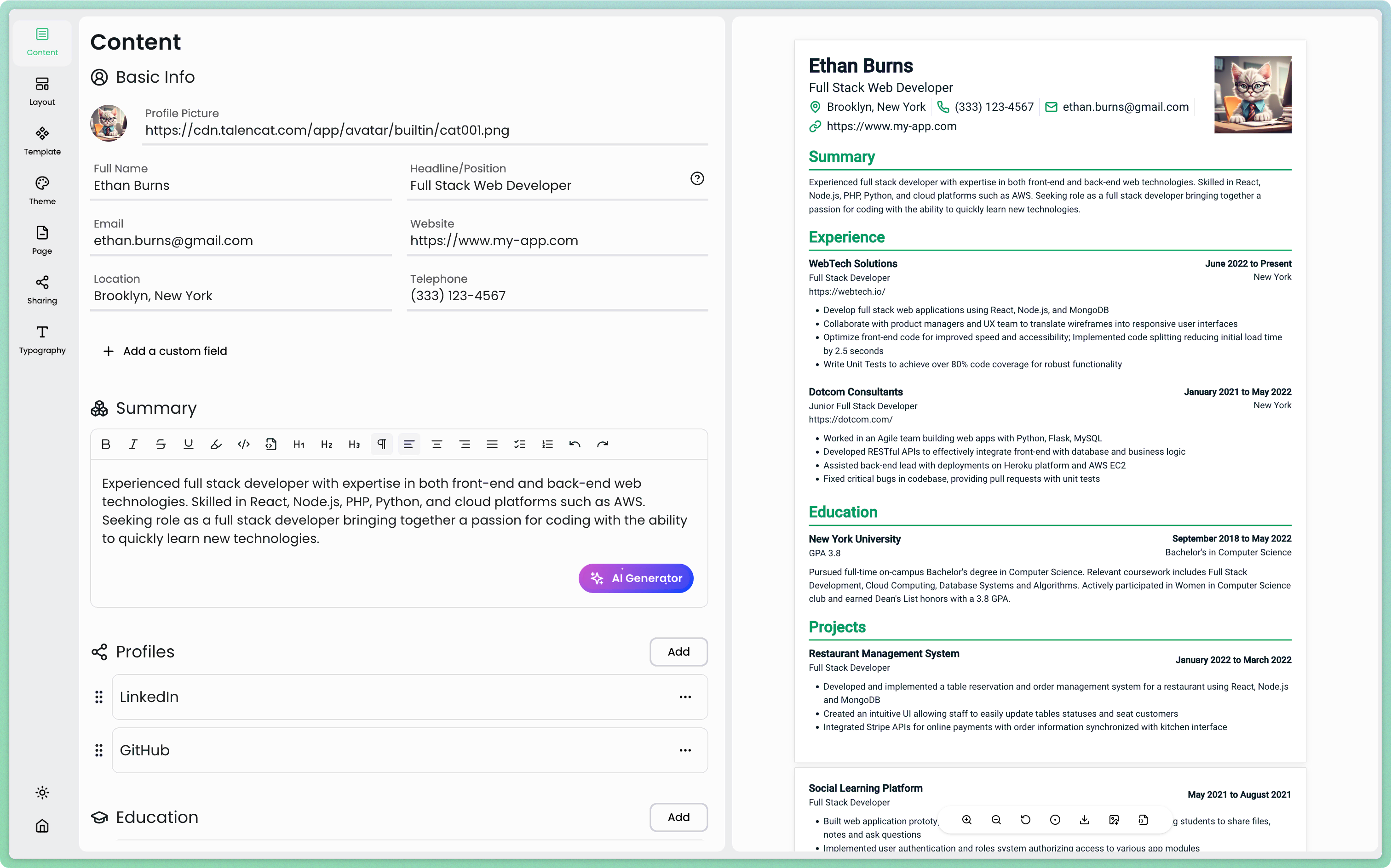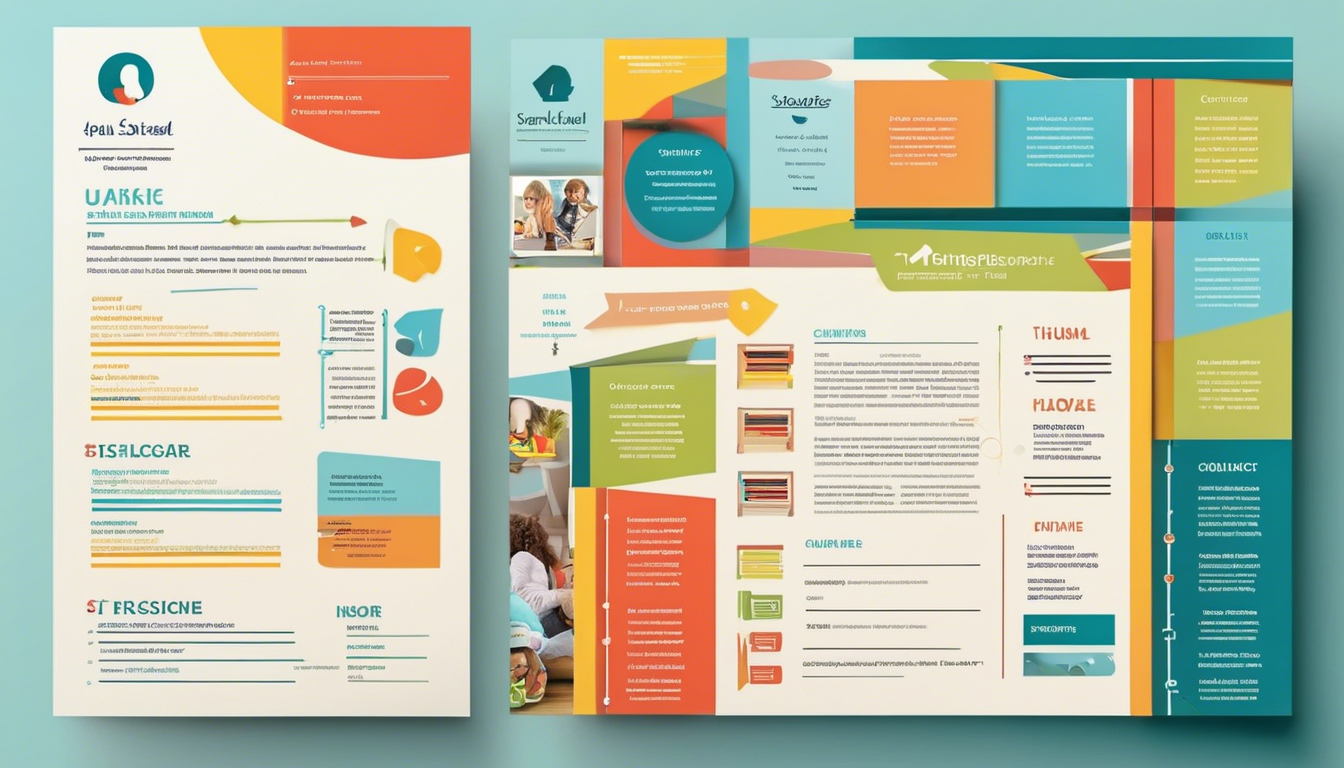Are you a researcher looking to land your dream job? Your resume is the key to opening doors in the competitive world of academia and scientific research. In this comprehensive guide, we'll walk you through the essential elements of a standout researcher resume, with a special focus on crafting the perfect resume summary.
Whether you're a molecular biologist, environmental scientist, or quantum computing expert, we've got you covered. Learn how to highlight your academic background, showcase your research experience, and effectively communicate your unique value proposition to potential employers.
Key Takeaways
- A researcher's job involves investigating and analyzing information in various fields, with tasks ranging from defining research questions to presenting findings.
- A researcher's resume should include sections like contact information, professional summary, education, research experience, publications, technical skills, and more.
- The resume summary is crucial as it provides a first impression, highlights expertise, and allows for customization to specific job applications.
- An effective researcher resume summary should be concise (3-5 sentences), highlight key skills and achievements, specify research interests, and align with the target position.
- The article provides a template and 50 examples of researcher resume summaries across various fields, demonstrating how to craft effective summaries for different specializations.
- AI-powered tools like TalenCat CV Maker can assist in generating professional resume summaries and other resume sections.

Introduction to A Researcher Position
A researcher's job involves investigating and analyzing information to gain new knowledge or insights in a particular field. Researchers work in various settings, including universities, government agencies, private companies, and non-profit organizations.
Here's a brief overview of what researchers do:
- Define research questions or problems
- Design and conduct studies or experiments
- Collect and analyze data
- Interpret results
- Write reports and papers to share findings
- Present research at conferences or meetings
- Collaborate with other experts
- Stay updated on developments in their field
- Secure funding through grants or proposals
Their specific tasks may vary depending on their field, which can range from sciences and medicine to social studies and humanities.

Building A Resume for A Research Job
Writing a researcher's resume requires highlighting your academic background, research experience, and relevant skills.
Here's a guide to structuring a researcher's resume:
1. Contact Information
- Name, phone, email, location
2. Professional Summary
- Brief overview of your research focus and key qualifications
3. Education
- Degrees, institutions, graduation dates
- Relevant coursework, thesis/dissertation titles
4. Research Experience
- Research positions held
- Key projects, methodologies used
- Significant findings or outcomes
5. Publications
- List peer-reviewed articles, books, or conference papers
6. Presentations
- Conferences, seminars, or workshops where you've presented
7. Technical Skills
- Research methodologies
- Data analysis tools
- Programming languages
- Laboratory techniques (if applicable)
8. Grants and Funding
- Any research grants received or assisted in obtaining
- Professional Memberships
- Relevant academic or professional associations
10. Awards and Honors
- Academic or research-related recognitions
11. References
- Available upon request (or list if required)
Among these sections, we should pay the most attention to the summary section of the resume. Because your resume summary gives employers an overview of your qualifications and sets the tone for the rest of the resume.
The Importance of Researcher Resume Summary
The summary section of a researcher's resume is crucial for several reasons:
- First impression: It's often the first thing employers read, setting the tone for the rest of the resume.
- Time-saving: Many recruiters or hiring managers spend only seconds scanning each resume. A strong summary quickly conveys your key qualifications.
- Highlighting expertise: It allows you to showcase your most relevant skills and research focus immediately.
- Tailoring opportunity: You can customize this section for each job application, emphasizing aspects that align with the position.
- Career narrative: It provides context for your career trajectory and research interests.
- Differentiating factor: A well-crafted summary can set you apart from other candidates with similar qualifications.
- Keywords: It's an ideal place to include field-specific keywords that might be used in applicant tracking systems.
- Research focus: You can clearly state your area of specialization or research interests.
- Career goals: It allows you to briefly mention your professional aspirations, showing alignment with the position.
- Addressing gaps: If needed, it can provide context for any career transitions or gaps in your research history.
Given its importance, the summary should be concise yet impactful, typically 3-5 sentences long. It should encapsulate your unique value as a researcher and entice the reader to delve deeper into your resume.
How to Write An Effective Researcher Resume Summary
To write an effective researcher resume summary, there are some helpful tips. You can always keep them in your mind to craft an effective and easy-to-understand summary section for your researcher's resume.
- Keep it concise: Aim for 3-5 sentences or 50-100 words.
- Start with your professional identity: Mention your field of expertise and years of experience.
- Highlight key skills: Focus on skills most relevant to the position.
- Mention significant achievements: Include notable research outcomes or publications.
- Specify your research interests: Briefly state your current focus areas.
- Tailor to the job: Align your summary with the specific position and institution.
- Use strong action verbs: Begin sentences with words like "Conducted," "Analyzed," or "Developed."
- Include relevant credentials: Mention advanced degrees or certifications.
- Avoid first-person pronouns: Start sentences with verbs instead of "I."
Researcher Resume Summary Template
If you keep the above writing points in mind, you can write a professional researcher resume summary like this:
[Your field] researcher with [X] years of experience specializing in [specific areas]. Skilled in [relevant research methods/tools]. Published [X] peer-reviewed articles and presented at [notable conferences]. Currently focused on [current research interests]. Seeking to leverage expertise in [specific skills] to contribute to [target institution/project].
Auto-Generate Researcher Resume Summary
If you find it difficult to write the researcher's resume summary manually, TalenCat CV Maker is a good option for you to automatically generate it.
TalenCat CV Maker is an AI-powered resume editor that allows you to generate a professional summary when trying to build a researcher's resume. You can just click the "AI Generator" button in the "Summary" section when you are using TalenCat CV Maker.

Apart from the summary section, it provides many other built-in resume modules to maximize the customization of your resume. In each module, you can still use generative AI to generate the tailored content.
So, click the following button to start generating a unique and professional resume summary for the researcher position.
50 Examples of Researcher's Resume Summary
After reading the above, if you still don't know how to write your researcher resume summary, you can refer to the following 50 proven examples. These examples include resume summaries in different research fields so that you can choose examples that are closer to your own research field for reference.
- Molecular biology researcher with 8 years of experience in gene editing techniques. Proficient in CRISPR-Cas9 and published 12 peer-reviewed articles. Seeking to advance cutting-edge genetic therapies.
- Environmental scientist specializing in climate change impacts for 6 years. Expertise in data modeling and GIS. Led 3 major field studies and contributed to IPCC report. Aiming to drive sustainable policy decisions.
- Neuroscience researcher with 5 years focused on Alzheimer's disease mechanisms. Skilled in brain imaging and animal models. Published in Nature Neuroscience. Dedicated to developing novel therapeutic approaches.
- Quantum computing researcher with 7 years of experience in qubit manipulation. Proficient in quantum algorithms and error correction. 15 conference presentations and 8 patents. Seeking to advance quantum supremacy.
- Social psychology researcher specializing in group dynamics for 4 years. Expertise in experimental design and statistical analysis. Published 6 articles on intergroup conflict. Passionate about applying research to real-world issues.
- Astrophysicist with 10 years of experience in exoplanet detection. Skilled in spectroscopy and data analysis. Contributed to the discovery of 5 Earth-like planets. Aiming to further our understanding of habitable worlds.
- Machine learning researcher focused on natural language processing for 6 years. Proficient in deep learning frameworks and big data analytics. Developed award-winning sentiment analysis algorithm. Seeking to push boundaries in AI language understanding.
- Biomedical engineer specializing in tissue engineering for 5 years. Expertise in 3D bioprinting and stem cell culture. Patent holder for novel scaffold design. Committed to advancing regenerative medicine therapies.
- Archaeologist with 8 years of experience in Mesoamerican civilizations. Skilled in remote sensing and artifact analysis. Led 4 major excavations and published comprehensive site reports. Dedicated to uncovering ancient cultural practices.
- Condensed matter physicist focusing on superconductivity for 7 years. Proficient in low-temperature experiments and theoretical modeling. Published in Physical Review Letters. Aiming to develop room-temperature superconductors.
- Public health researcher specializing in epidemiology for 6 years. Expertise in disease surveillance and outbreak investigation. Contributed to WHO guidelines on pandemic preparedness. Committed to improving global health security.
- Materials scientist with 9 years of experience in nanomaterials. Skilled in electron microscopy and thin-film deposition. Developed novel graphene-based composites. Seeking to innovate in sustainable energy materials.
- Cognitive psychologist focusing on memory and learning for 5 years. Proficient in EEG and fMRI techniques. Published 10 articles on cognitive enhancement strategies. Passionate about applying findings to educational practices.
- Marine biologist specializing in coral reef ecosystems for 7 years. Expertise in underwater surveying and species identification. Led conservation projects in the Great Barrier Reef. Dedicated to preserving marine biodiversity.
- Robotics researcher with 6 years of experience in autonomous systems. Skilled in computer vision and motion planning algorithms. Developed award-winning self-driving vehicle prototype. Aiming to advance human-robot collaboration.
- Economic researcher focusing on behavioral economics for 4 years. Proficient in experimental design and econometrics. Published in American Economic Review. Seeking to apply insights to public policy formulation.
- Geochemist with 8 years of experience in isotope analysis. Expertise in mass spectrometry and trace element detection. Contributed to climate reconstruction studies. Committed to understanding Earth's long-term climate cycles.
- Immunology researcher specializing in cancer immunotherapy for 6 years. Skilled in flow cytometry and cell culture techniques. Developed novel CAR-T cell approach. Dedicated to enhancing cancer treatment efficacy.
- Linguistic anthropologist with 5 years focused on endangered languages. Proficient in phonetic analysis and fieldwork methodologies. Documented 3 previously unrecorded languages. Passionate about preserving linguistic diversity.
- Renewable energy researcher with 7 years of experience in solar cell technology. Expertise in thin-film fabrication and efficiency testing. Hold 5 patents in perovskite solar cells. Seeking to revolutionize sustainable energy production.
- Bioinformatics researcher with 6 years specializing in genomic data analysis. Proficient in Python and R. Developed novel algorithm for cancer mutation detection. Seeking to advance personalized medicine through computational approaches.
- Particle physicist focused on dark matter detection for 8 years. Expertise in cryogenic detectors and data acquisition systems. Contributed to XENON1T experiment. Dedicated to unraveling the mysteries of the universe.
- Ethnomusicologist with 5 years studying indigenous music traditions. Skilled in field recording and spectral analysis. Published comprehensive study on Amazonian musical practices. Committed to preserving cultural heritage through sound.
- Polymer chemist specializing in biodegradable plastics for 7 years. Proficient in polymer synthesis and characterization techniques. Holds 3 patents for eco-friendly packaging materials. Aiming to reduce environmental impact of consumer goods.
- Cognitive neuroscientist focusing on decision-making processes for 6 years. Expertise in fMRI and TMS techniques. Published in Neuron on neural correlates of risk assessment. Passionate about applying findings to improve clinical interventions.
- Agricultural researcher with 9 years experience in crop genetics. Skilled in CRISPR gene editing and plant breeding. Developed drought-resistant wheat variety. Dedicated to enhancing global food security through biotechnology.
- Computer vision researcher specializing in 3D scene reconstruction for 5 years. Proficient in deep learning and SLAM algorithms. Led development of AR navigation system. Seeking to push boundaries in spatial computing.
- Marine geologist with 7 years focused on deep-sea hydrothermal vents. Expertise in submersible operation and geochemical analysis. Discovered 3 new vent fields. Committed to understanding Earth's subsurface biosphere.
- Theoretical physicist specializing in quantum gravity for 8 years. Skilled in mathematical modeling and numerical simulations. Published seminal paper on holographic principle. Aiming to reconcile quantum mechanics with general relativity.
- Developmental psychologist researching early childhood cognition for 6 years. Proficient in eye-tracking and behavioral testing methods. Authored 15 peer-reviewed articles on infant learning. Dedicated to improving early education strategies.
- Atmospheric scientist with 7 years experience in air quality modeling. Expertise in remote sensing and data assimilation techniques. Contributed to EPA air quality standards. Seeking to mitigate urban pollution through advanced forecasting.
- Stem cell biologist focusing on regenerative medicine for 5 years. Skilled in iPSC technology and organoid culture. Developed novel protocol for cardiac tissue engineering. Committed to translating research into clinical therapies.
- Cybersecurity researcher specializing in network intrusion detection for 8 years. Proficient in machine learning and traffic analysis. Patented AI-driven threat detection system. Aiming to enhance digital infrastructure resilience.
- Paleoecologist with 6 years studying past climate change impacts. Expertise in sediment core analysis and isotope geochemistry. Led multidisciplinary project on Pleistocene megafauna extinctions. Dedicated to informing current conservation strategies.
- Organic chemist specializing in natural product synthesis for 7 years. Skilled in multi-step synthesis and structure elucidation. Completed total synthesis of complex marine alkaloid. Seeking to develop novel pharmaceutical compounds.
- Human-computer interaction researcher with 5 years focus on accessibility. Proficient in user testing and interface design. Developed award-winning assistive technology for visually impaired users. Passionate about inclusive technology.
- Planetary scientist specializing in Martian geology for 9 years. Expertise in remote sensing and spectroscopy. Contributed to Mars 2020 rover mission. Committed to unraveling the geological history of Mars.
- Behavioral ecologist studying animal communication for 6 years. Skilled in bioacoustics and experimental design. Published groundbreaking work on whale song complexity. Dedicated to conservation of marine mammals.
- Nanotechnology researcher focusing on drug delivery systems for 7 years. Proficient in nanoparticle synthesis and characterization. Developed targeted nanocarriers for cancer therapy. Aiming to revolutionize therapeutic approaches.
- Computational linguist with 5 years experience in machine translation. Expertise in natural language processing and deep learning. Led development of multilingual chatbot system. Seeking to break down language barriers through AI.
- Bioarchaeologist specializing in ancient human remains for 8 years. Skilled in osteological analysis and stable isotope techniques. Uncovered migration patterns in Neolithic Europe. Committed to understanding human evolutionary history.
- Nuclear engineer focusing on fusion reactor design for 7 years. Proficient in plasma physics and magnetohydrodynamics. Contributed to ITER project. Dedicated to developing sustainable clean energy solutions.
- Cognitive scientist researching artificial general intelligence for 6 years. Expertise in reinforcement learning and neural network architectures. Published in NeurIPS on meta-learning algorithms. Aiming to create human-level AI systems.
- Food scientist specializing in flavor chemistry for 5 years. Skilled in gas chromatography and sensory evaluation. Developed novel natural flavoring compounds. Seeking to enhance food quality and sustainability.
- Structural biologist with 8 years experience in protein crystallography. Proficient in X-ray diffraction and cryo-EM techniques. Solved structure of key viral enzyme. Committed to accelerating drug discovery through structural insights.
- Urban ecologist studying biodiversity in cities for 6 years. Expertise in GIS and community ecology methods. Led citywide green infrastructure assessment. Dedicated to promoting sustainable urban development.
- Quantum information scientist focusing on quantum cryptography for 7 years. Skilled in quantum key distribution and entanglement-based protocols. Patented unhackable quantum communication device. Aiming to revolutionize data security.
- Neuroethologist studying insect navigation for 5 years. Proficient in electrophysiology and behavioral assays. Published in Science on ant spatial memory. Passionate about bio-inspired robotics applications.
- Cosmologist specializing in dark energy for 9 years. Expertise in large-scale structure simulations and observational techniques. Contributed to Dark Energy Survey. Committed to unraveling the nature of cosmic acceleration.
- Microbial ecologist with 6 years focus on antibiotic resistance in soil bacteria. Skilled in metagenomics and bioinformatics. Discovered novel resistance mechanisms in environmental microbes. Seeking to address global antibiotic crisis.
Summary
Crafting an effective researcher resume, particularly the summary section, is crucial for standing out in the competitive academic and scientific job market. The article emphasizes the importance of tailoring the resume to specific positions, highlighting relevant skills and achievements, and concisely communicating one's research focus and career goals.
By following the provided guidelines, templates, and examples, researchers across various fields can create compelling resume summaries that capture the attention of potential employers and effectively showcase their expertise and potential contributions to their chosen field of study.




